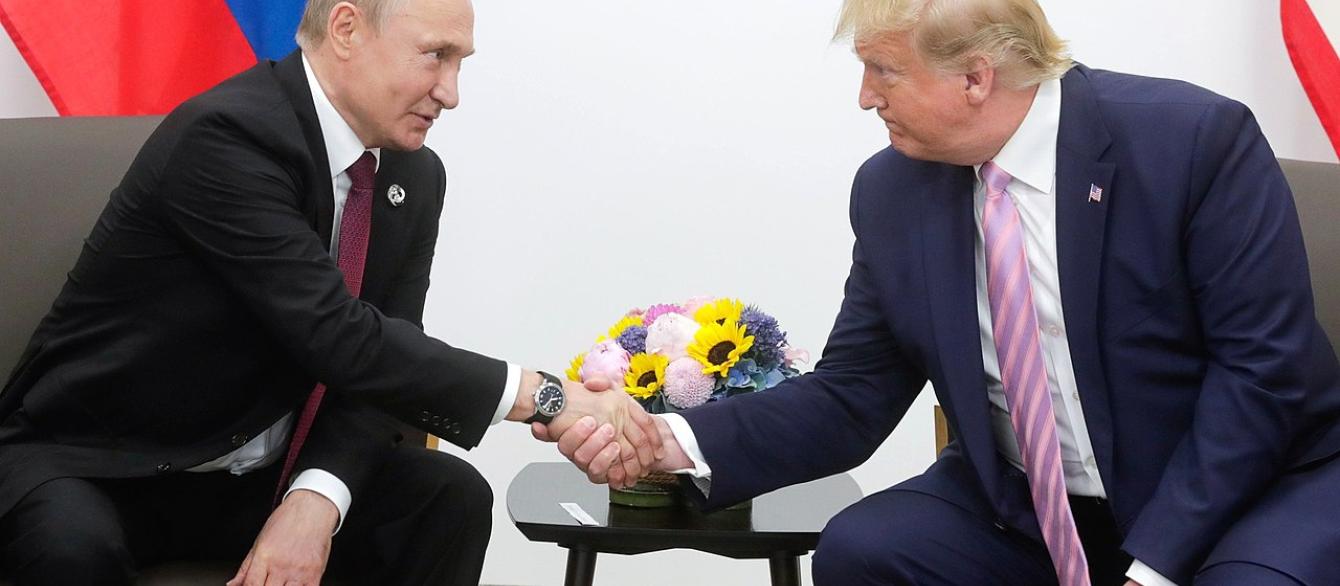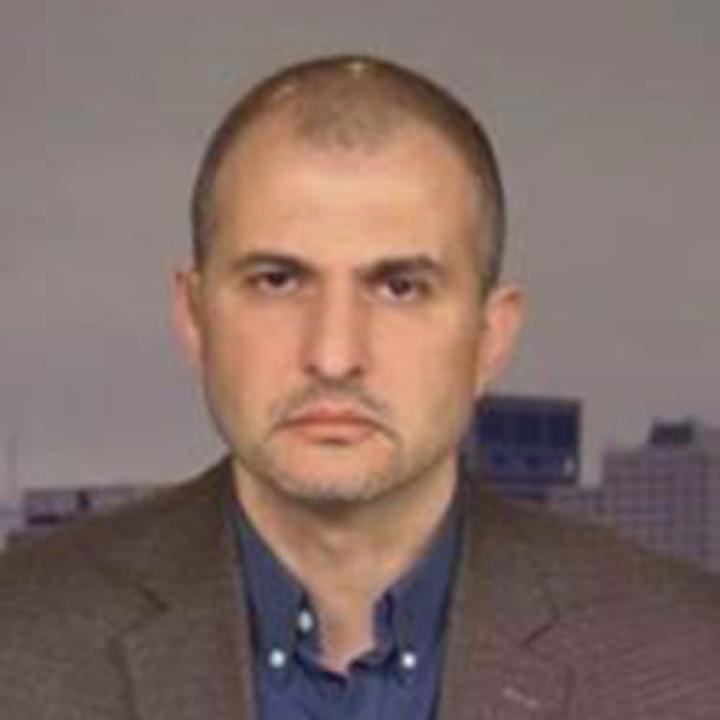This article was originally published by Russia Matters.
The latest of the Levada Center’s polls on Russians’ attitudes toward foreign countries reaffirms the proposition that whatever major foreign policy decision Vladimir Putin makes, most of his country’s subjects tend to eventually publicly support, even if that decision constitutes a U-turn of the kind Russia’s authoritarian ruler did when deciding to pivot from West to East.
For instance, as recently as last year, almost three quarters of respondents to these regular polls told Levada that they had a negative attitude toward the U.S. under Joe Biden. However, fast-forward to the return of Donald Trump — whom Putin has clearly favored over Biden — to the White House in 2025, and you will discover that this share declined by more than a third, while the share of Russians with a positive attitude toward America has [nearly] doubled (Table 1).
One reason for this change in Russians’ attitudes toward America is, obviously, that Trump, unlike Biden, throughout his third presidential campaign, reportedly hinted at readiness to support some of Russia’s demands if he were to get a chance to mediate an end to Russian-Ukrainian hostilities from the White House. But many Russians would not have appreciated these hints if Russia’s state-controlled national television channels — which over half of them rely on for news, according to Levada — had not, on orders from the Kremlin, publicized them, ramping up the positive coverage of Trump, who had not only had “a very good” relationship with the Russian leader, but also whom Putin apparently viewed as more likely to strike a deal on ending the Russia-Ukraine war on terms that would be favorable for Russia.
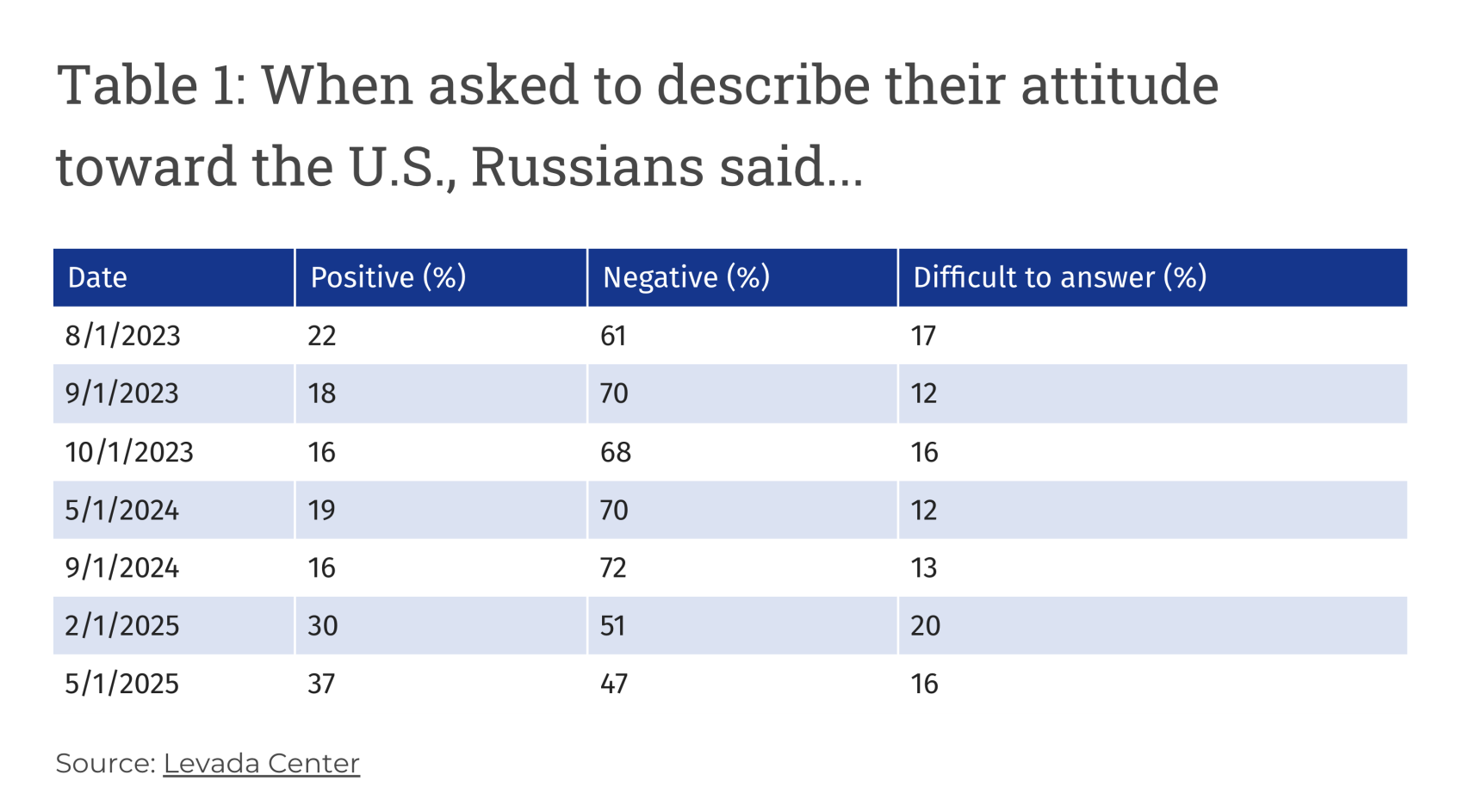
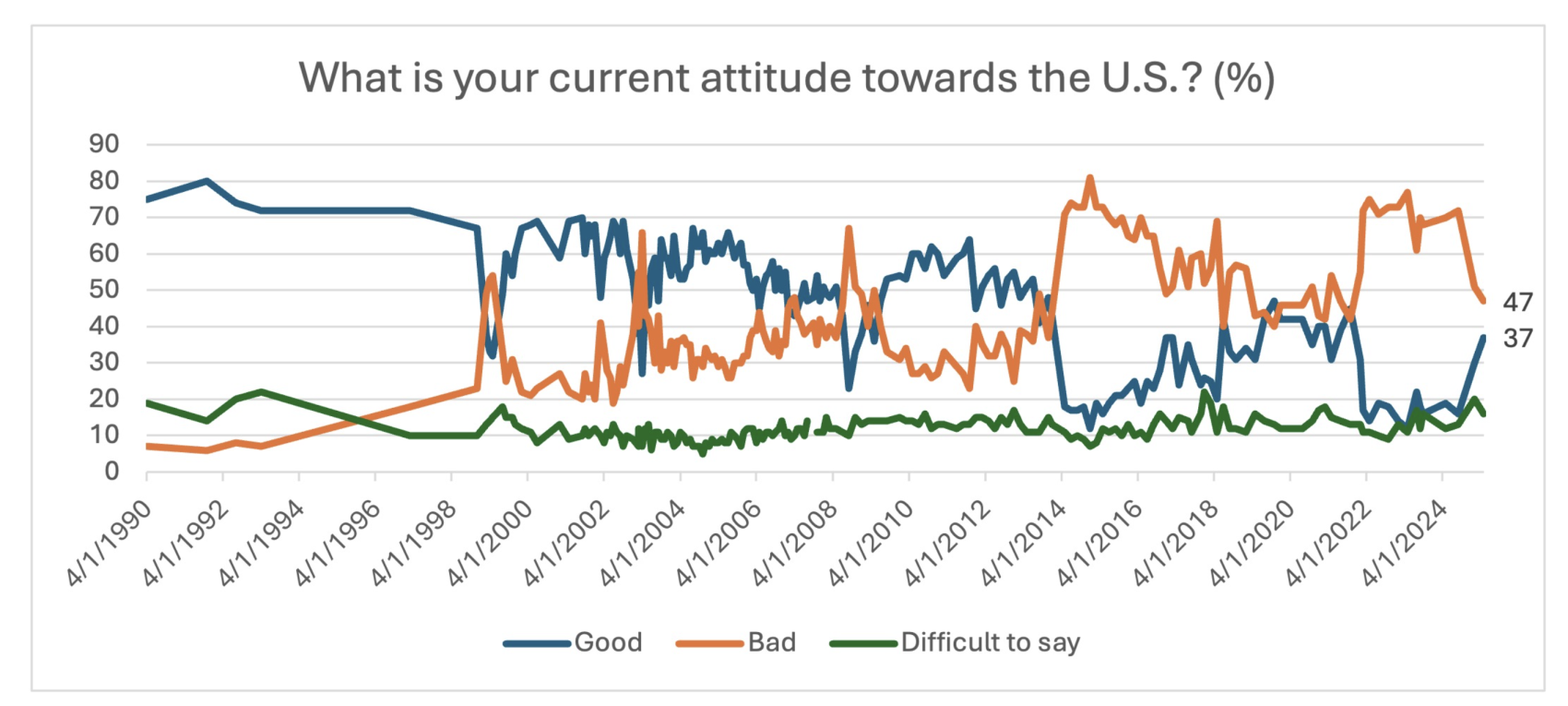
Figure 1
That Russians, like their leader, are eventually warming up to Trump’s America in spite of the ongoing Cold War 2.0 also follows from Levada’s estimate that the share of respondents who place the U.S. among the five countries most hostile to their homeland declined from 76% in the last year of Biden’s presidency to 40% in the first year of Trump’s second presidency. In fact, that share (40%) is the lowest since the midpoint of Barack Obama’s presidency (Table 2).
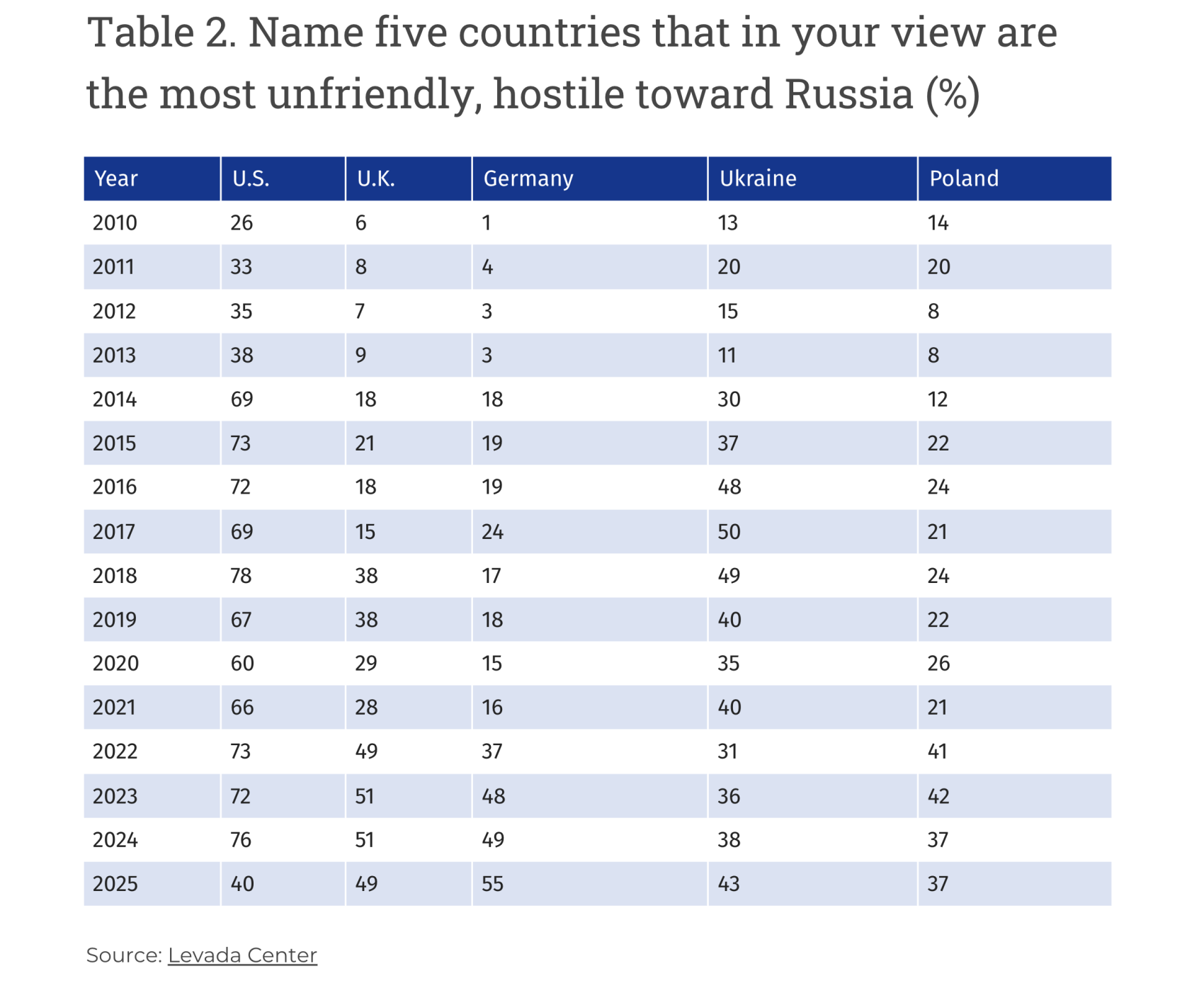
In contrast to America under Trump — whom, as stated above, Putin sees as more inclined to support an end to the Russian-Ukrainian war on terms favorable for Russia — the share of Russians with a negative view of the EU, most of whose members remain committed to supporting Ukraine in its conflict with Russia, remains considerably higher than that [with a negative view] of the U.S. In May 2025, as many as 64% of Russians had a negative view of the EU, none of whose executive leaders have anything comparable to Trump’s relationship with Putin for obvious reasons. In contrast, the share of Russians with a negative view of the U.S. was 47% that month, according to Levada. In fact, the share of Russians with a dim view of the EU has been at times comparable with the share of Russians who have a negative view of Ukraine, despite the fact that EU members’ armed forces are not directly involved in combat against Russian forces, while Ukraine’s are. For instance, the share of Russians with a negative view of the EU in February 2025 was 61%, while the share of Russians with a negative view of Ukraine was 68% that month (Tables 3 and 4). Also of note, Russians blame Ukraine and Europe equally for the absence of a negotiated end to the war (36% each), according to Levada’s recent poll. In contrast, only 14% blame Trump’s America for the failure of peace negotiations, which a record 64% of Russians support as of this May, according to that poll.
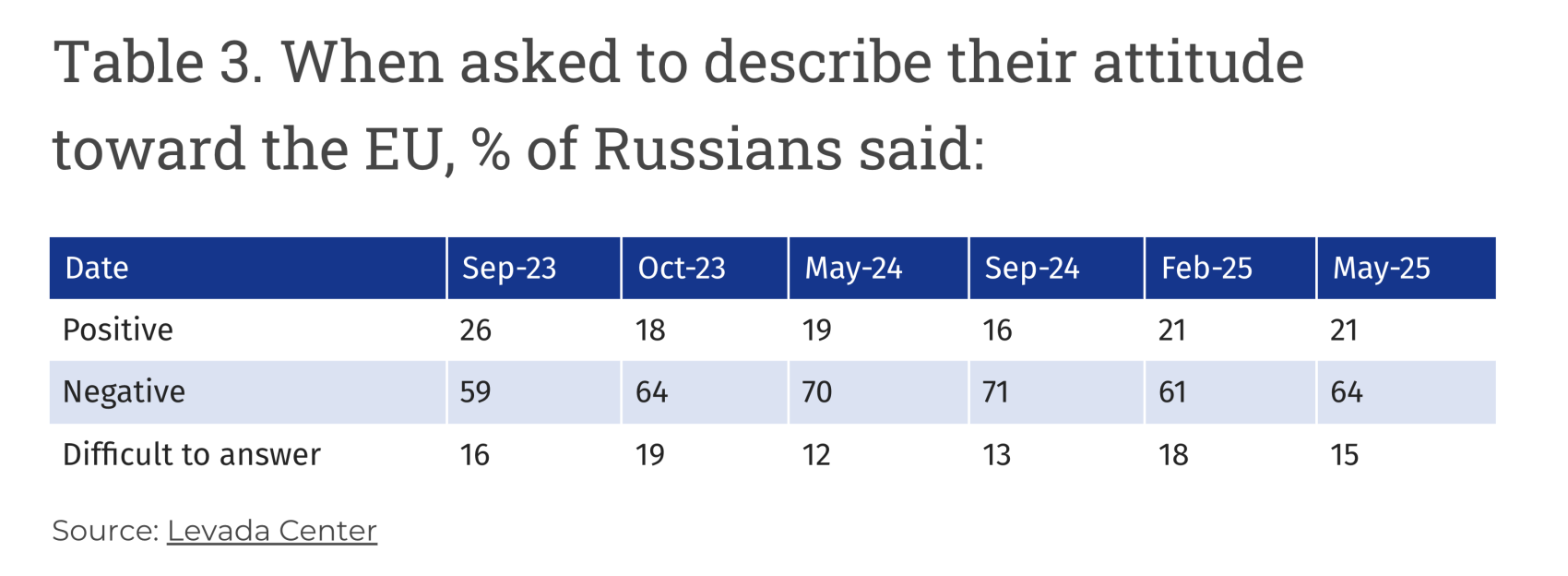
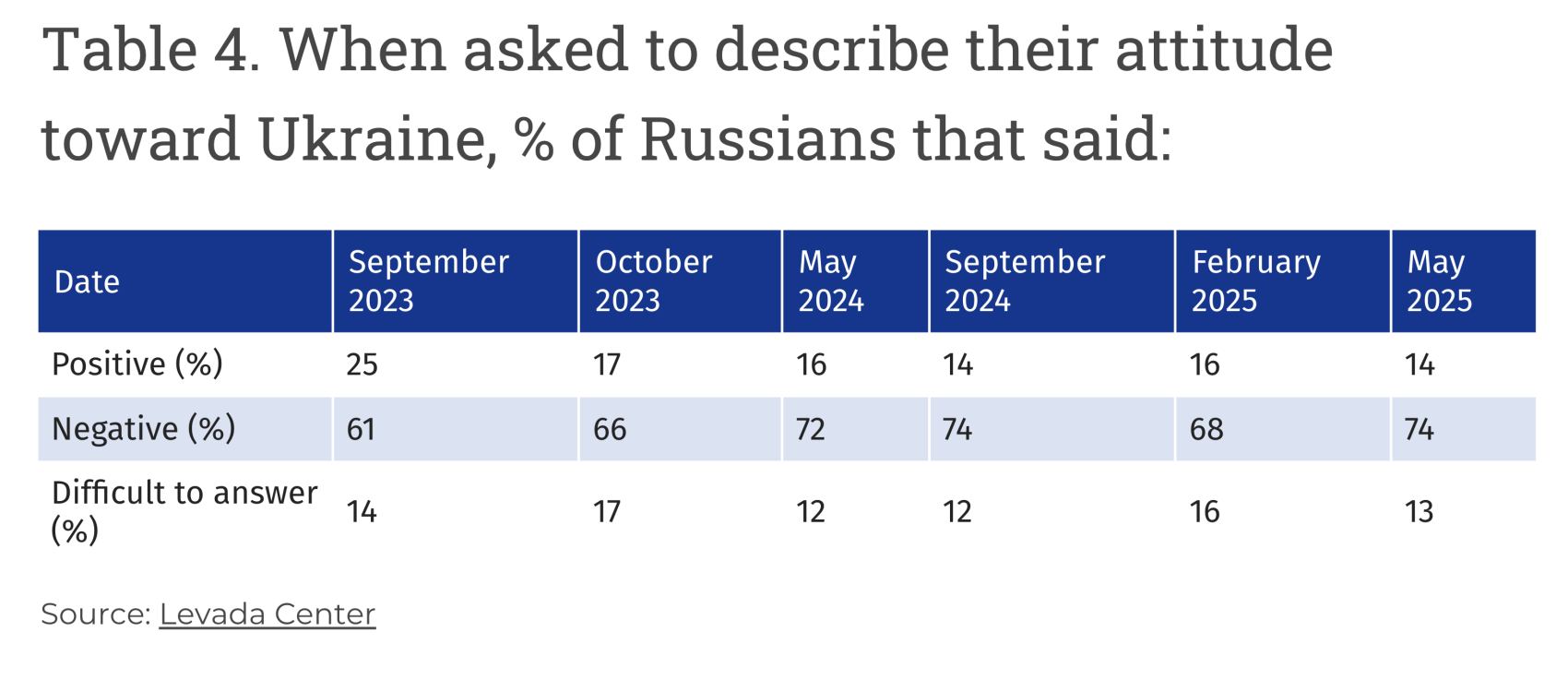
Also of note, the Russians’ persistently negative views of Ukraine and its European allies contrast with the high regard Russians have for countries such as Belarus, China, Kazakhstan and India, which all are portrayed mostly positively by Russia’s Kremlin-controlled national TV channels. At the same time, North Korea, which is the only belligerent directly involved in combat on Russia’s side and which also supplies ammunition and weapons to Russia, continues to lag behind these countries. That said, the share of Russians who view the Hermit Kingdom as Russia’s ally soared from 1% in 2012 to 30% in 2025. My bet is that this share will continue to grow, especially if Putin’s Russia continues to gravitate toward North Korea’s political model, transforming Moscow, which its leaders have seen as the Third Rome for centuries, into what some opponents of modern Russia increasingly see as a second Pyongyang.
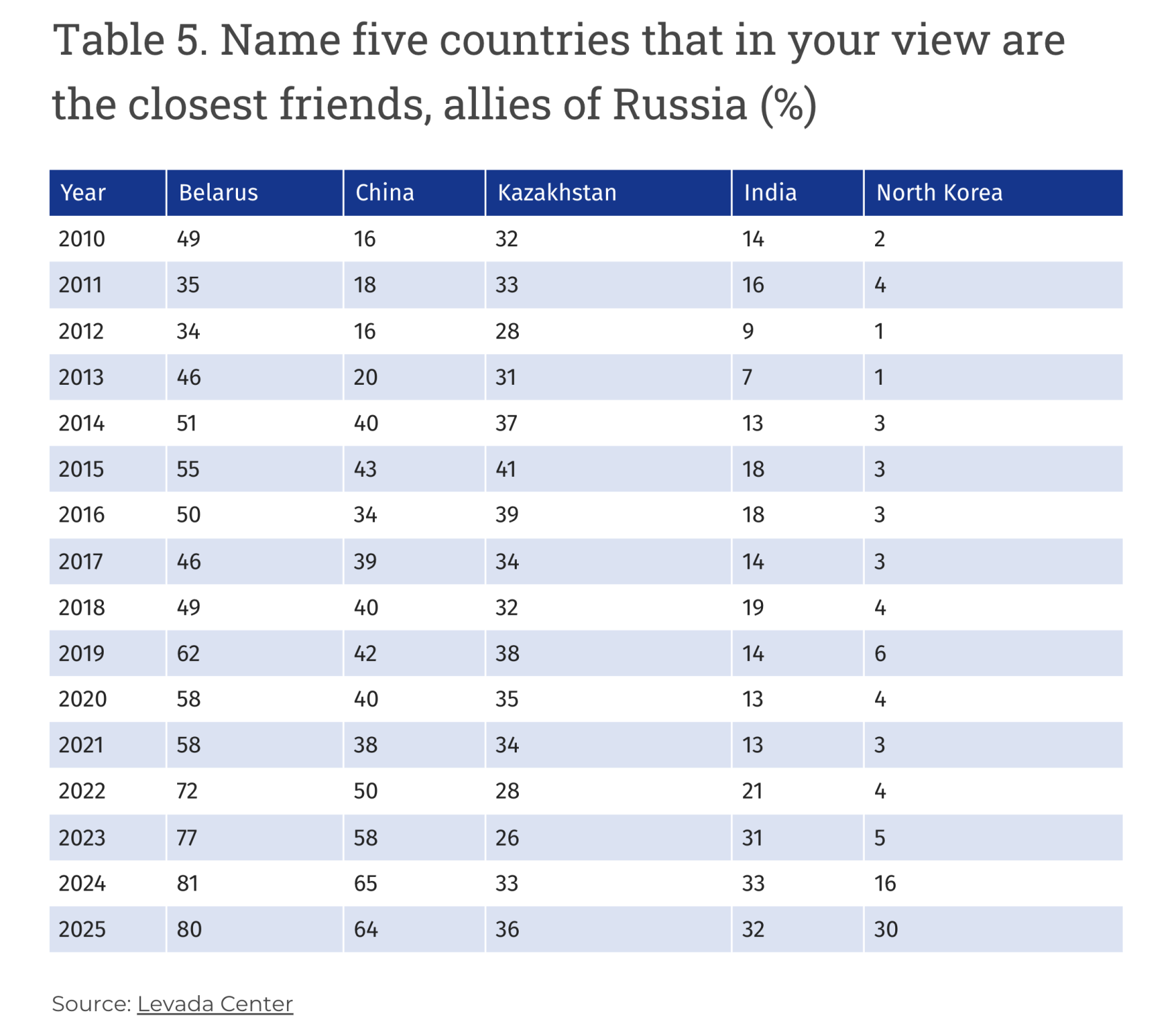
The data presented in Tables 2 and 5 demonstrate that Russians have been recently fairly persistent [sic] in their views of which “world majority" countries are their country’s top allies, as well as which Western countries are most hostile to Russia. Nevertheless, a strong majority of Russians (80%) believe that Russia should mend fences with the U.S. and other Western countries, even though many of them (66%) also believe Russia’s relations with the West will always be based on mistrust (Figure 2, Tables 6 and 7). Given the enormous influence that the Kremlin exercises on public opinion in Russia,1 the Levada respondents’ belief that Russia should improve relations with the West could be evidence that Putin himself presently sees the downsides of keeping all eggs in one (Chinese) basket.2 Should, however, Trump “disappoint” Putin on Ukraine (or other issues), expect another swing — first in Putin’s views and then in Russian public opinion — away from normalizing relations with the West and toward even deeper alignment with China.
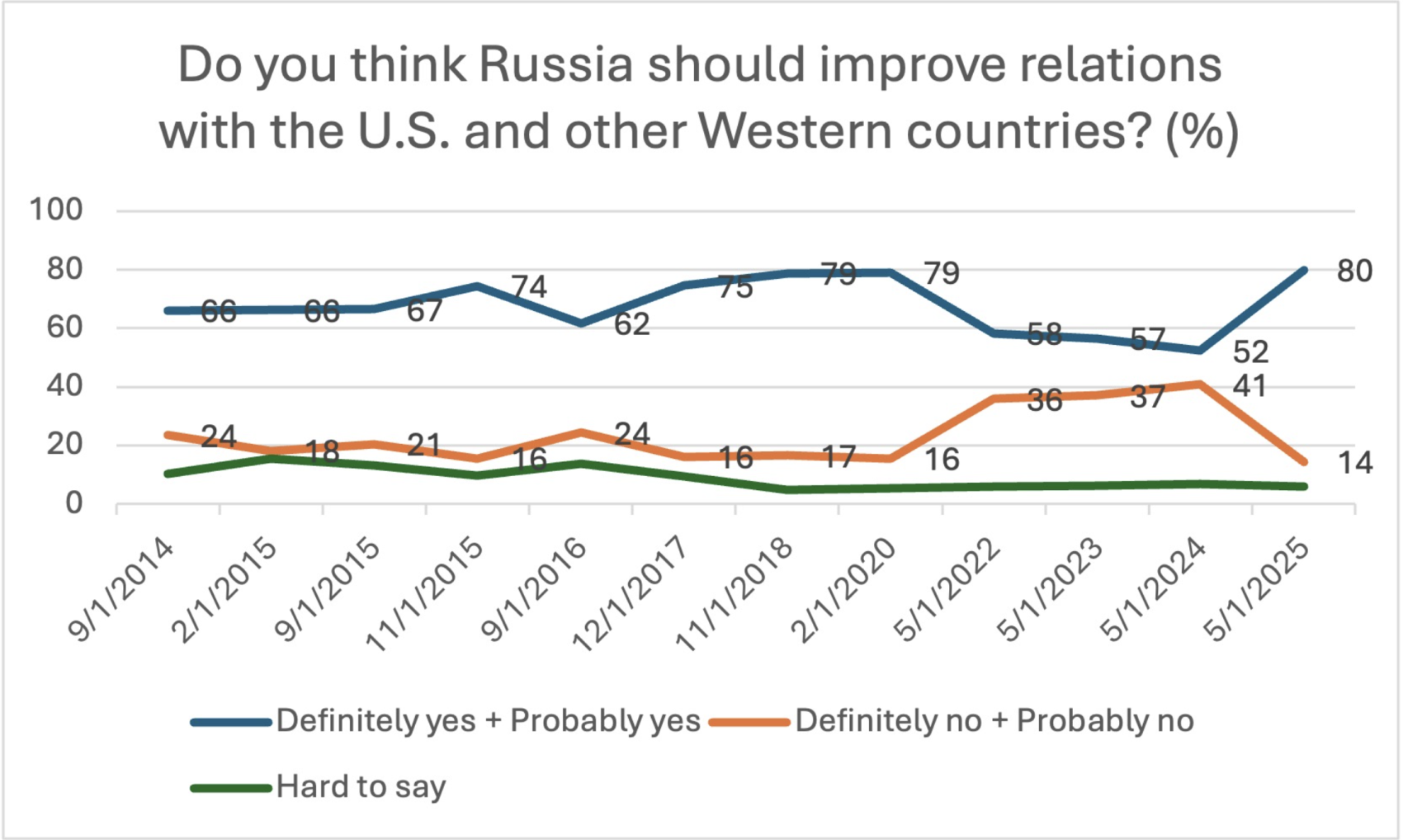
Figure 2
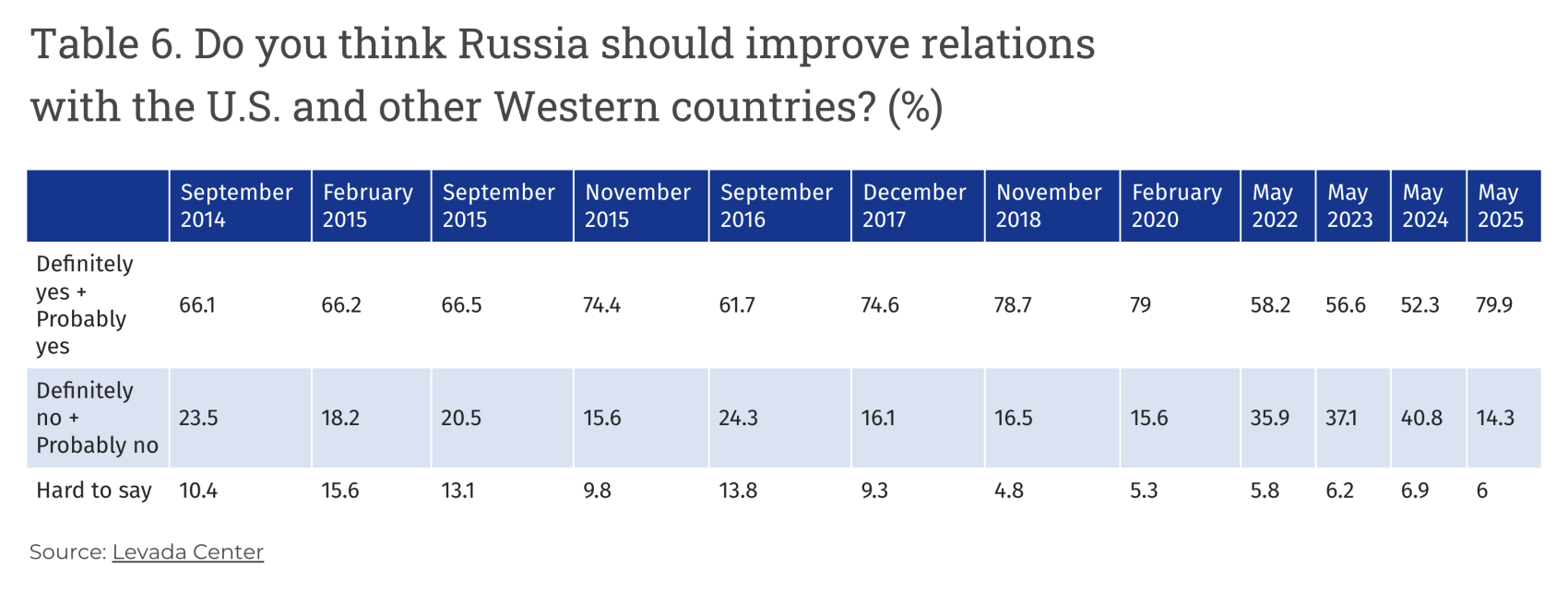
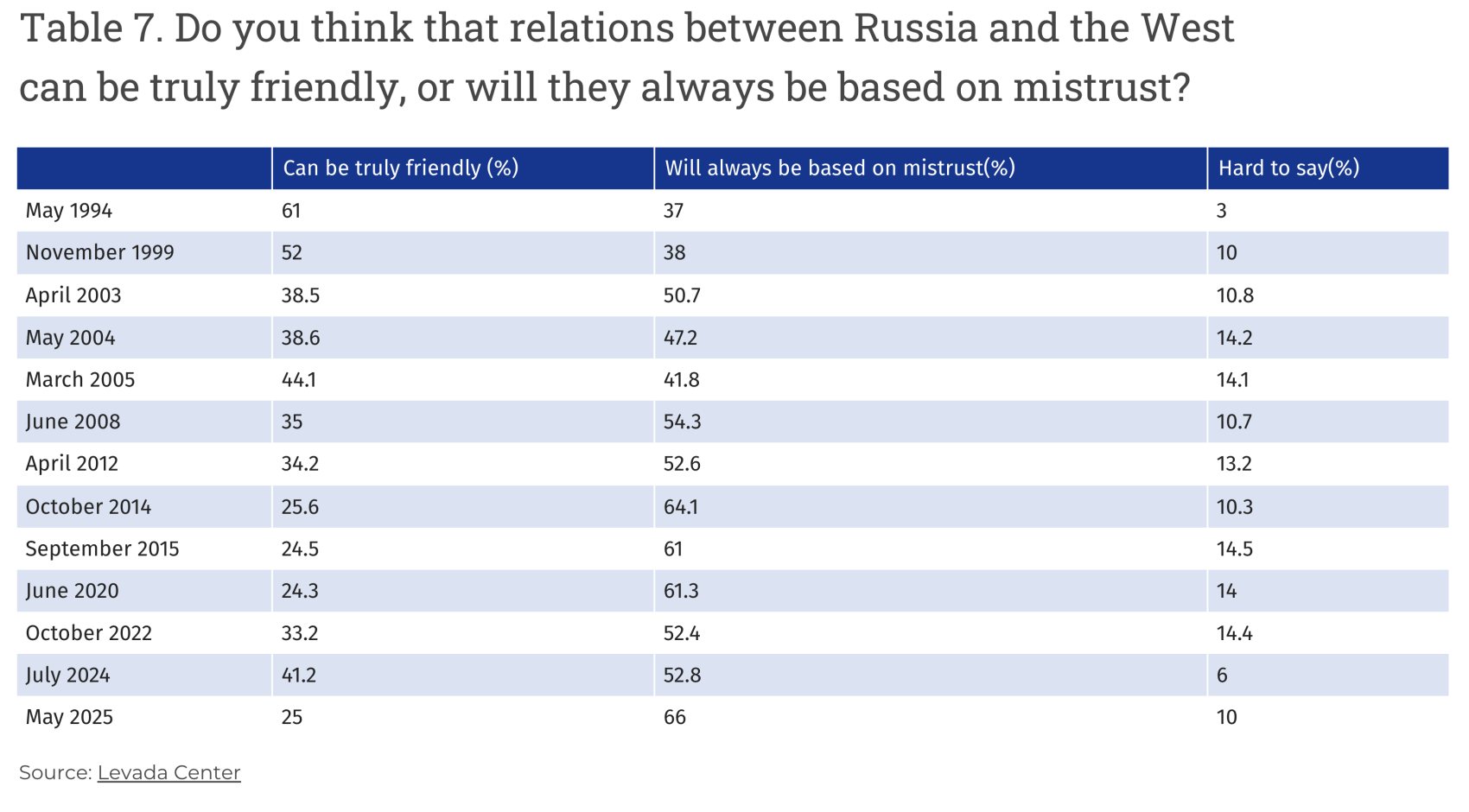
Footnotes
- Obviously, it is not an entirely one-way street when it comes to the Kremlin’s influence on Russian public opinion. The Kremlin tries to factor in Russians’ views when making key decisions, but ordinary Russians themselves acknowledge they have little say in those. The most recent Levada poll on this issue took place in 2021 and shows 75% of Russians believe they cannot “influence adoption of state decisions in the country” in what reaffirms that Putin enjoys independence in decision-making in foreign, defense and security domains of a kind not seen since the days of Joseph Stalin.
- The risks of doing so is something that not only ordinary Russians see but also some in his Praetorian Guard.
Opinions expressed herein are solely those of the author.





